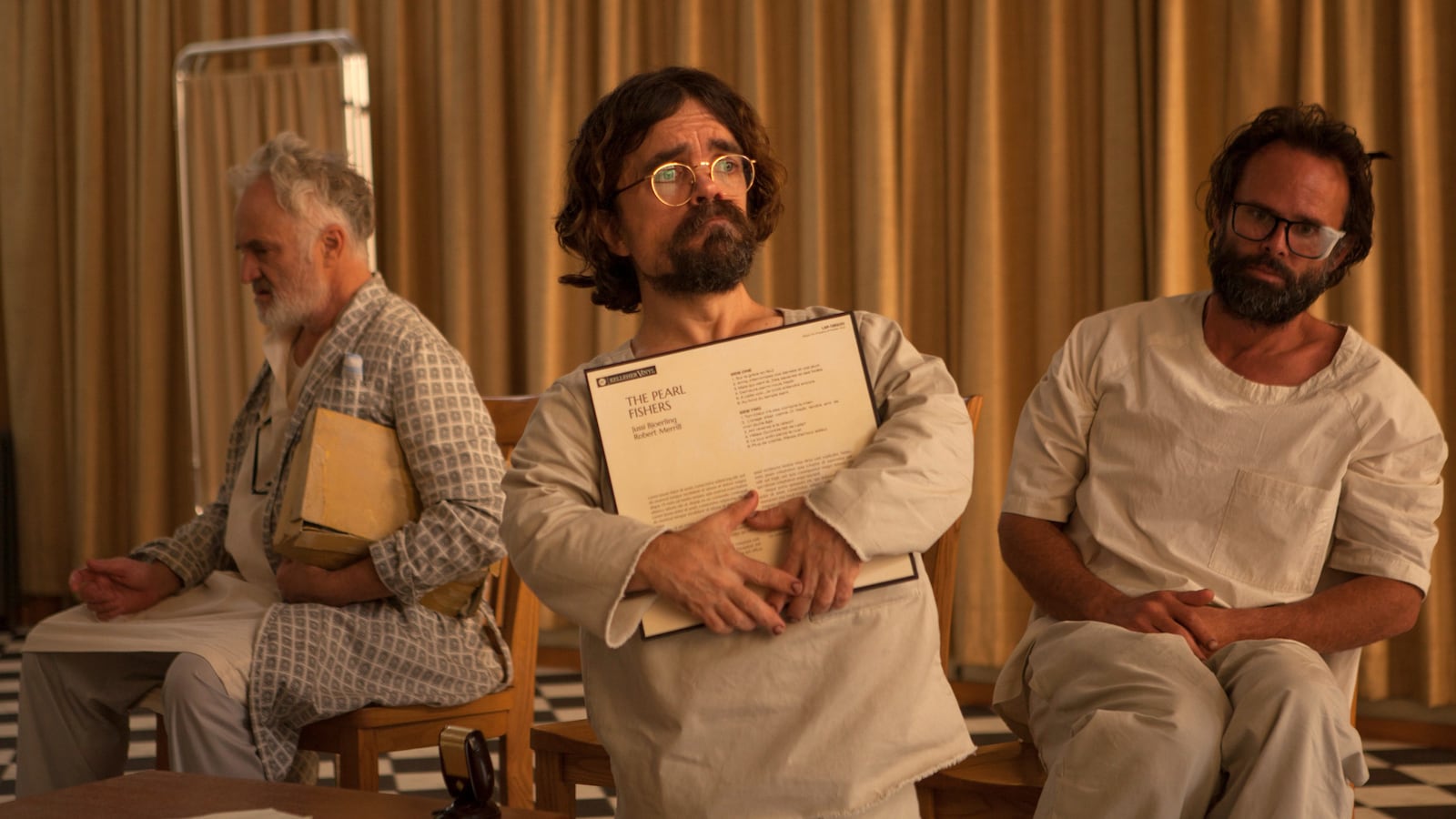A trio of mental patients, each convinced they’re the son of God, are forced to go through therapy together in Three Christs, and while that sounds like the set-up for a barroom joke, there’s unfortunately scant comedy to be found in Jon Avnet’s based-on-real-events drama. Rather, this adaptation of Milton Rokeach’s The Three Christs of Ypsilanti peddles the sort of heartstring-pulling uplift traditionally reserved for year-end awards hopefuls—a tack that’s as dreary as the film’s chances of receiving accolades are slim.
Finally in theaters Jan. 10, following its original Toronto International Film Festival debut in 2017, Three Christs stars Richard Gere as Dr. Alan Stone, a psychologist interested in studying paranoid schizophrenics. In 1959, he arrives at a Michigan state mental hospital and immediately butts heads with superintendent Dr. Orbus (Kevin Pollack) over the fact that his previous published paper slammed state-run facilities as horrid warehouses run by “bureaucratic, unfeeling conformists.” Opposed to electroshock and drug treatments, Stone wants to heal the unwell through compassionate therapy, and he’s quickly drawn to two patients, Joseph (Peter Dinklage) and Clyde (Bradley Whitford), who believe they’re Christ—a condition that so fascinates Stone, he finds the only other Michigan man with the same delusion, Leon (Walton Goggins), and puts them together to see what will come of their interactions.
Since Three Christs commences with a despondent Stone narrating his story in hindsight in preparation for a hearing about his obviously frowned-upon conduct, it’s easy to anticipate that his methods will result in sparks. Alas, those fireworks are of a decidedly muted and familiar sort—which is true of the entire film, starting with unorthodox Stone’s contentious rapport with old-school boss Orbus and his professional benefactor Dr. Rogers (Stephen Root), who’s worried about Stone’s radical ideas. It’s a rebel-vs-the-system dramatic structure about as old as the Good Book itself, and Avnet and co-screenwriter Eric Nazarian don’t tweak it in the slightest. On the contrary, they lean heavily into convention at every turn, so that each heartening moment features at least one soundbite-y line of dialogue, accompanied by the swelling and swaying orchestral music of Denis Lenoir’s mawkish score.
With golden sunlight illuminating the auditorium where they hold their sessions, Stone and his three Christs get to tackling their hang-ups. Joseph, ridiculed for his height since childhood, believes he’s British and desperately wants to receive return letters from Dr. Orbus, who he hopes will grant him release; Clyde, mourning the death of his wife (who perished during an abortion), incessantly showers to rid himself of the imaginary stench of rotting flesh that plagues him; and Leon, a military vet driven loony by his religious mother, has eyes for Stone’s fetching new assistant Becky (Charlotte Hope). Wracked by guilt, they all use their Christ personas as a means of protecting themselves from their inner pain—an insight that, like their backstories, the film explicates in scenes that employ dull exposition in place of actual dramatic action.
Three Christs conveys everything in ham-fisted fashion, so that Stone’s childhood and wartime service—as well as his own fondness for using an assumed name to hide his true self—is recounted in for-the-audience speeches by his wife Ruth (Julianna Margulies). There’s also a subplot concerning Ruth’s jealous suspicions about Stone’s romantic interest in Becky (since Ruth was his prior assistant), but there’s nothing to it. That goes double for Stone’s time spent with his wannabe-divine threesome, who scratch their heads, flail their limbs, and act menacing and withdrawn in ways that are too mannered to be taken seriously and yet not outlandish enough to be comical. With actors as well-equipped for humor as Goggins, Dinklage and Whitford, it’s almost a crime that they’re barely given a single amusing thing to do or say; instead, they’re merely asked to flaunt a variety of ticks, to rant and rail in padded cells, and then to flash the occasional tender-souled look so we know that, deep down, they’re just damaged individuals in need of love and understanding.
Avnet believes that a respectful, straight-faced approach is the best route to celebrating Stone’s empathetic, one-on-one care, but the sincerity with which the director treats every utterance and interaction is stifling. Three Christs’ atmosphere is thick with cornball sentimentality. “It’s brave and important, what you’re doing,” Ruth tells Stone, whom Rogers describes as “entirely predictable and yet always surprising.” As befitting a rule-breaker, Stone eventually pushes things too far by penning his patients fake letters, the notion being that such a deception—and exploitation of their delusion—might actually lead to a cure for schizophrenia. The results, wouldn’t you know it, are positive. Though trouble awaits from killjoy Dr. Orbus, Stone is clearly headed for some form of triumph, as is telegraphed by bigwig Dr. Abraham (Jane Alexander), who’s asked to actually say, out loud, “Your work is novel, brilliant and dangerous. You decide if the gains outweigh the obvious risks.”
Spoiler alert: they do! Three Christs trots out the revelation that Stone is possessed by his own God complex—because he thinks he can benevolently heal the sick—which is almost as schematically contrived as a post-tragedy finale in which Leon speaks to the doctor on a frozen lake, meaning he’s walking on water. It’s not altogether shocking that the filmmaker behind 2008’s Righteous Kill, the pre-Irishman fiasco pairing Al Pacino with Robert De Niro, leaves his accomplished actors with little to work with. Yet it’s somewhat puzzling that Avnet doesn’t even attempt a bit of off-the-wall absurdity—the closest he comes is a chapel-set incident in which organ music transports Joseph, Leon and Clyde into a state of wacko-dancing bliss, and even then, the effect is more aww-shucks cute than outright funny.
No doubt a fear of mocking the mentally handicapped led to such sensitivity. Three Christs’ inspirational tack, however, reduces everyone to two-dimensional pawns in a game designed to end with Stone smiling knowingly to himself, blessed with the realization that, despite the human cost of his tactics, he was right, and good, and hey, he also learned something about himself along the way. Viewers would be wise to temper expectations for experiencing any similar enlightenment.


